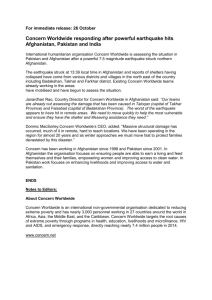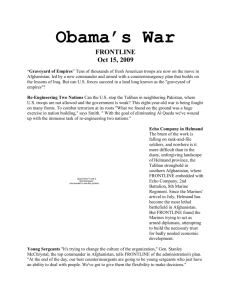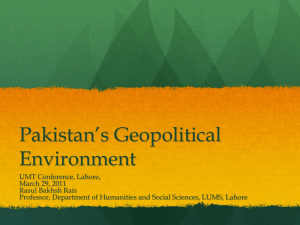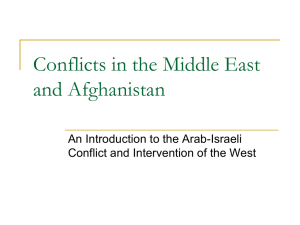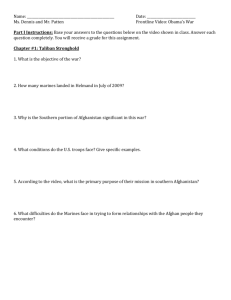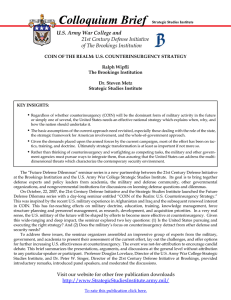Advantage 1: Hegemony
advertisement
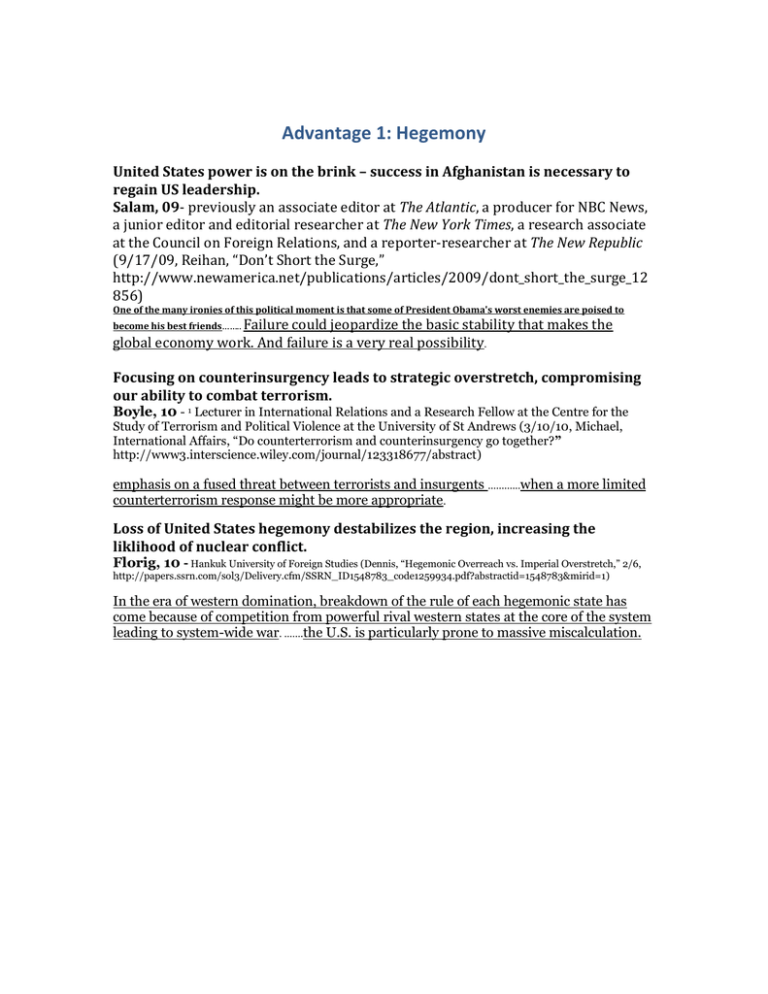
Advantage 1: Hegemony United States power is on the brink – success in Afghanistan is necessary to regain US leadership. Salam, 09- previously an associate editor at The Atlantic, a producer for NBC News, a junior editor and editorial researcher at The New York Times, a research associate at the Council on Foreign Relations, and a reporter-researcher at The New Republic (9/17/09, Reihan, “Don’t Short the Surge,” http://www.newamerica.net/publications/articles/2009/dont_short_the_surge_12 856) One of the many ironies of this political moment is that some of President Obama's worst enemies are poised to become his best friends…….. Failure could jeopardize the basic stability that makes the global economy work. And failure is a very real possibility. Focusing on counterinsurgency leads to strategic overstretch, compromising our ability to combat terrorism. Boyle, 10 - 1 Lecturer in International Relations and a Research Fellow at the Centre for the Study of Terrorism and Political Violence at the University of St Andrews (3/10/10, Michael, International Affairs, “Do counterterrorism and counterinsurgency go together?” http://www3.interscience.wiley.com/journal/123318677/abstract) emphasis on a fused threat between terrorists and insurgents …………when a more limited counterterrorism response might be more appropriate. Loss of United States hegemony destabilizes the region, increasing the liklihood of nuclear conflict. Florig, 10 - Hankuk University of Foreign Studies (Dennis, “Hegemonic Overreach vs. Imperial Overstretch,” 2/6, http://papers.ssrn.com/sol3/Delivery.cfm/SSRN_ID1548783_code1259934.pdf?abstractid=1548783&mirid=1) In the era of western domination, breakdown of the rule of each hegemonic state has come because of competition from powerful rival western states at the core of the system leading to system-wide war. …….the U.S. is particularly prone to massive miscalculation. Advantage 2: the Insurgency The troop requirements to clear insurgents in Afghanistan’s mountain terrain are impossible to meet under a combined COIN/CT strategy Eland et al 09 - Senior Fellow and Director of the Center on Peace & Liberty at The Independent Institute. Dr. Eland is a graduate of Iowa State University and received an M.B.A. in applied economics and a Ph.D. in Public Policy from George Washington University. He has been Director of Defense Policy Studies at the Cato Institute (December 9, Ivan Eland, Peter Galbraith - Former Deputy Special Representative of the Secretary-General of the United Nations to Afghanistan and Assistant Secretary-General of the U.N.; former Ambassador to Croatia , Charles Pena Senior Fellow, The Independent Institute , “Can the U.S. Withdraw from Afghanistan and Iraq?” http://www.independent.org/events/transcript.asp?eventID=145 ) Afghanistan is a much different country and a much harder fight to win. ….especially when the U.S. is likely to leave as the President signaled his intention to at least start pulling out troops by 2011. A large counterinsurgency footprint drives insurgents to Pakistan, mobilizes the Pakistani Taliban and will cause Pakistan to collapse Akhtar, 10- professor of international relations, and a senior analyst & writer. He was the dean of faculty of management, Baluchistan university, and former chairman of International Relations Department, Karachi university (1/26/10, Shameem, “Pakistan’s Instability : The US War Factor,” http://www.islamonline.net/servlet/Satellite?c=Article_C&cid=1262372328640&pagename=Zone-EnglishMuslim_Affairs/MAELayout#**1) If it is a war against extremists and militancy inside Pakistan, it is a civil war because its origins stem from the US, ……..may erupt at any moment, thus destabilizing the state. Pakistan collapse causes global nuclear conflict – draws in China, India and Russia Pitt, 09- a New York Times and internationally bestselling author of two books: "War on Iraq: What Team Bush Doesn't Want You to Know" and "The Greatest Sedition Is Silence." (5/8/09, William, “Unstable Pakistan Threatens the World,” http://www.arabamericannews.com/news/index.php?mod=article&cat=commenta ry&article=2183) Pakistan is now trembling on the edge of violent chaos, and is doing so with nuclear weapons in its hip pocket, right in the middle of one of the most dangerous neighborhoods in the world…..hands of terrorist organizations could place the entire world on a collision course with unimaginable disaster. Counterinsurgency AFF First, we’re not buying what the Obama Administration is selling: the war in Afghanistan is a colossal failure and evidence to the contrary is military fiction. Michael A. Cohen, former Senior Research Fellow at the New America Foundation, B.A. in International Relations from American University and M.A. in International Relations from Columbia University, served in the Department of State as chief speechwriter for U.S. Representative to the United Nations Bill Richardson and Undersecretary of State Stuart Eizenstat, currently serves on the board of the National Security Network and has taught at Columbia University’s School of International and Public Affairs, 1229-2010 (“The White House's Growing 'Credibility Gap' on Afghanistan,” Democracy Arsenal—an international relations blog published by the Center for American Progress and the Century Foundation's Security and Peace Initiative, December 29th, Available Online at http://progressiverealist.org/blogpost/white-houses-growing-credibility-gap-afghanistan, Accessed 0103-2011) the security situation in Afghanistan is worsening; …………..Perhaps the most important story of the past year in Afghanistan is that even with the inclusion of more than 30,000 more US and NATO troops the security situation has worsened dramatically. Second, the campaign to mislead the American people requires us to challenge official ideas—only by rejecting the Obama Administration’s Afghanistan portrayal can we prevent the expansion of military control over U.S. foreign policy. Stephen M. Walt 2011, Robert and Rene Belfer Professor of International Relations at Harvard University, 2011 (“Where Do Bad Ideas Come From?,” Foreign Policy, January/February, Available Online athttp://www.foreignpolicy.com/articles/2011/01/02/where_do_bad_ideas_come_from?pr int=yes&hidecomments=yes&page=full, Accessed 01-03-2011) The same strategy works to shield leaders from accountability: ……..Criticizing the military would invite others to question one's patriotism and therefore is out of bounds. This trend is not healthy because civilians who are overly deferential to the military are unlikely to question military advice, even when it might be bad for the troops as well as the country. Third, the takeover of our overall grand strategy by military leaders, results in stubbornness, unwillingness to admit mistakes leading to more conflicts and more wars that the United States is dragged into. Eric Martin 2010, editor of Obsidian Wings, The Progressive Realist, and American Footprints—three leading foreign policy blogs, holds a B.A. in Philosophy from New York University and a J.D. from Fordham University, 10-09-2010 (“If All You Have Is A Hammer…,” American Footprints—a foreign policy blog, October 9th, Available Online at http://americanfootprints.com/wp/2010/10/if-all-you-ask-is-a-hammer/, Accessed 10-192010) leaders (up to and including the President) defer to the judgment of top military brass to the extent that conventional wisdom tells that to disagree with what the leading generals say is near-sacrilege……….. military leaders repeatedly ask for more resources, more troops, more time to achieve the desired objective which, to them, is always of paramount importance because to withdraw absent achieving the goal is to be denied victory Contention Two: U.S. Military Power The counterinsurgency mission in Afghanistan is undermining the strength of U.S. military power A dogmatic commitment to Counterinsurgency creates an expectations gap and ensures constant policy failure. Gian P. Gentile 2010, Assistant Professor of History and Director of the Military History Program at the United States Military Academy, Lieutenant Colonel in the U.S. Army who has served two tours of duty in Iraq, Visiting Fellow at the Council on Foreign Relations, 2010 (“Freeing the Army from the Counterinsurgency Straightjacket,” Joint Force Quarterly, Issue 58, July, Available Online athttp://ndu.edu/press/counterinsurgencystraightjacket.html, Accessed 08-31-2010) it is problematic whether or not the United States can achieve a positive strategic outcome with counterinsurgency in distant, foreign countries. ........as a last resort and with restraint, it should be used at the start and that it can change "entire societies" for the better. 8 And, the plan is the best way to maintain American hegemony—it maximizes deterrence while abandoning foolish and ineffective adventurism. Christopher Layne 2006, Associate Professor in the Bush School of Government and Public Service at Texas A&M University and Research Fellow with the Center on Peace and Liberty at The Independent Institute, 2006 (“America cannot rely on power alone,” Financial Times, August 24th, Available Online at http://www.ft.com/cms/s/f7bb5fb2-330c-11db-87ac-0000779e2340.html, Accessed 04-12-2007) Hegemony, however, is not omnipotence …..America's hegemonic power often seems illusory because it is applied to unattainable objectives such as nation-building and promotion of democracy. US neoconservatives and liberal imperialists alike seem to think that the world is a piece of clay and that the US can mould other nations and cultures in its own image. Plan: The United States federal government should draw down the population-centric counterinsurgency presence of its military in Afghanistan to 68,000 or less troops conducting counterterrorism operations by October 2011 and 30,000 or less troops conducting counterterrorism operations by July 2012. Contention Three: Solvency First, the plan’s shift to counter-terrorism is the most effective strategy—it reduces casualties, reassures allies, and keeps the pressure on extremists. Thomas Snodgrass 2010, Retired Colonel in the U.S. Air Force, Director of Military Affairs for The Society of Americans for National Existence, Former Adjunct Professor of History at Embry-Riddle Aeronautical University, 8-05-2010 (“Conservatives: Abandoning Counterinsurgency,” The American Thinker, August 5th, Available Online at http://www.americanthinker.com/2010/08/conservatives_abandoning_count.html, Accessed 08-30-2010) The change in mission from COIN to CT/UW would significantly reduce the number of U.S. casualties by taking U.S. forces out of the high-risk task of population protection ……. Therefore, we will demonstrate that we all share a common commitment to a long-term objective -- prohibiting the return of al-Qaeda and Pashtun Taliban domination of Afghanistan. A "stable" Afghan government under Hamid Karzai is a losing proposition that should be carefully abandoned as inconspicuously and quickly as possible. Finally, the plan is a substantial reduction in military presence. The Afghanistan Study Group—an ad hoc group of public policy practitioners, former U.S. government officials, academics, business representatives, policy-concerned activists and association leaders concerned with the Obama administration’s policy course in Afghanistan, 8-16-2010 (“The Way Forward: A Five-Point Approach,” A New Way Forward: Rethinking U.S. Strategy in Afghanistan, August 16th, Available Online at http://www.afghanistanstudygroup.org/NewWayForward_report.pdf, Accessed 08-29-2010) the U.S. should downsize and eventually discontinue combat operations in southern Afghanistan. The U.S. needs to draw down its military presence, which radicalizes many Pashtuns and often aids the Taliban’s recruitment effort. This step would save the U.S. at least $60 billion to $80 billion per year and reduce local resentment at our large and intrusive military presence.
